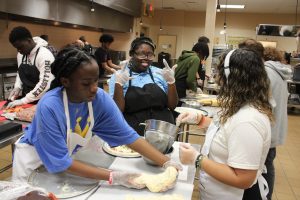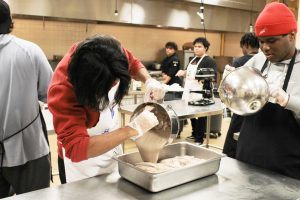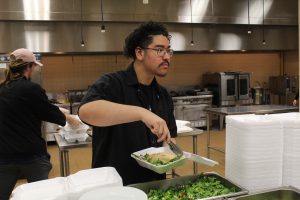The Culinary Academy is the perfect place to start if you are curious about cooking or if you’re thinking about pursuing a culinary career. You will gain useful skills that you will be able to use throughout your life, whether you’re cooking at home or at your job. You will have the chance to gain the certifications (ServSafe and NRFSP) necessary to work in a restaurant in Florida. You will also create a resume and be provided with any job opportunities that come up in the surrounding area. Through various catering functions the academy participates in, such as homecoming and teacher lunches, you can obtain your volunteer hours. The mission statement of the Culinary Arts Academy is to” implement rigorous learning experiences to prepare students for all post-high school options in the culinary field”. Upon completing this academy, St Lucie County has accreditation agreements with local culinary schools, and you could get as many as 9 college credit hours.
Culinary 1: Introduction to Culinary Arts
CERTIFICATION: NRFSP– National Registry
In your first year in the culinary academy, you will participate in basic labs that will help you get used to following recipes, working in groups, becoming familiar with the kitchen tools and equipment, knife skills and focusing on safety and sanitation. You will have an opportunity to obtain an NRFSP certification. You will also study customer service, professionalism, baking basics and stocks, soups and sauces. Finally, you will study the history of the food service industry, create a resume, practice interviewing, and perform an entry level job search.
Culinary 2: Principles of Food Science
CERTIFICATION: ServSafe – Food Safety Manager and NRFSP– National Registry
During the second year of the culinary academy, you will review your safety and sanition skills and prepare for certification testing. You will take the ServSafe and NRFSP exams. These five-year certifications educates you on the safe practices of food handling, preparation and service, and will enable you to get a supervisory food service job during and post high school. You will also receive college credits. Furthermore, you will also focus on FOH/BOH stations/jobs, principles of food science, food plating, recipe conversions, yields, and food cost. The second half of
the year you will learn the basic principles of nutrition, menu creation and cultural cuisine.
Culinary 3: Advanced Cooking Methods and Baking
CERTIFICATION: ServSafe – Food Safety Manager and NRFSP– National Registry
Culinary 3 is the final year of the culinary academy. Safety and sanitation will be reviewed at the beginning of the year, and you will have the last opportunity to receive your ServSafe and NRFSP certifications. During this year you spend most of your time in the kitchen lab focusing on various cooking methods. If there are any field trips, catering events and/or competitions, you will have the chance to participate in them. You will also concentrate on preparing advanced food products in cooking/baking, meat fabrication and preparation as well as food selection, purchasing and storage. Also covered are management skills.
Culinary 4: Teacher’s assistant/Sous chef (Track 1, 2, and 3)
CERTIFICATION: ServSafe – Food Safety Manager and NRFSP– National Registry
Culinary 4 is an optional course for anyone who joins the academy and completes Culinary 1-3. Should you decide to be a part of this class you will join one of the classes you have already completed and assist the teacher and the students in any way you can. Culinary 4 is a great opportunity for anyone seriously considering a culinary career; along with enhancing the skills you’ve already learned, it will enable you to develop a strong work ethic and enhanced leadership skills.








